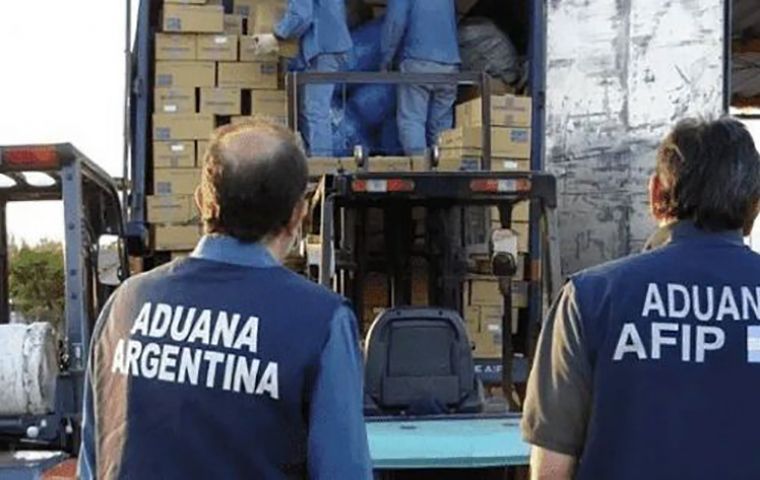MercoPress. South Atlantic News Agency
Argentine Customs takes measures against under-invoicing exporters
 “The reestablishment of reference values offers a first control of the value of the merchandise to avoid abusive maneuvers,” said Traverso.
“The reestablishment of reference values offers a first control of the value of the merchandise to avoid abusive maneuvers,” said Traverso. The Argentine Customs Bureau (DGA) has set new criteria for the selection of potential cases of under-invoicing. The new controls will be carried out once the goods have been released to leave the country, it was announced.
After some twenty meat exporters were suspected of fraudulent under-invoicing in the past few months to avoid export taxes, the Customs Bureau has decided to extend controls to every shipment to be sent abroad and apply reference values to those products.
In other words, goods are worth what the government says they are worth and not what the exporter claims to have charged the buyer to fight to underreport of values.
Tax Bureau (AFIP) Chief Mercedes Marcó del Pont signed a resolution published Thursday in the Official Gazette explaining that the new monitoring will be almost with a magnifying glass on the stated price of sale and exporters may be summoned to account for any emerging discrepancies, but only after the ship has already left the dock.
Customs agents will have 120 days to spot these alleged irregularities and may ask the exporter: price list, brochures, catalogues (when necessary according to the nature of the merchandise in question), customs document of entry of the merchandise into the country of destination (unless it is not feasible to obtain it with an affidavit from the exporter), bank instrumentation, cost analysis (production, acquisition, export), contract, purchase order, export invoice, debit/credit notes, information on international prices of the exported merchandise and/or any other element that the official deems appropriate.
Exporters quoted by the Buenos Aires daily Ámbito have complained that such thorough documentation will bring on additional costs. “It forces us to put people especially dedicated to that,” said Miguel Ponce, consultant and head of the Center for Foreign Trade Studies of the XXI Century.
In November 2017, the previous administration of then-President Mauricio Macri had repealed a similar 2009 resolution which provided for the use of “criterion values” to determine if there was under-invoicing in foreign sales because it had become obsolete. After all, export duties had previously been eliminated from most agricultural and industrial products to lower the margin for illicit activities. However, it maintained the provisions aimed at controlling declared sale prices. If a suspicious operation was found, it was passed through the “red channel”.
Now Customs has reimposed the criterion of verifying the prices with which the different goods leave the country. “The reestablishment of reference values offers a first control of the value of the merchandise to avoid abusive manoeuvres,” said Customs Director Silvia Traverso, who added that “the previous government carried out a gradual dismantling of this tool.”
She added that “until now, reference values have been established for exports of pears, apples, garlic, pork, tomato, concentrated must, blueberries, powdered milk, onion, potato, raisins, sea bass and beef.”
Traverso also pointed out that ”the meat processing industry and, in particular, meat exporters are a sector that has greatly benefited from the international rise in prices“ and explained that the fines it recently applied to companies ”are not isolated but are part of the different measures that our organization took to recover inspection tools over the last year, tools that the previous government dismantled or did not use.”
The agency's decision modifies the procedures that the DGA areas devoted to export value control had been following since 1999. The instruments available to ”confront evasion and combat under-invoicing practices in the export of merchandise were expanded.”




Top Comments
Disclaimer & comment rulesCommenting for this story is now closed.
If you have a Facebook account, become a fan and comment on our Facebook Page!